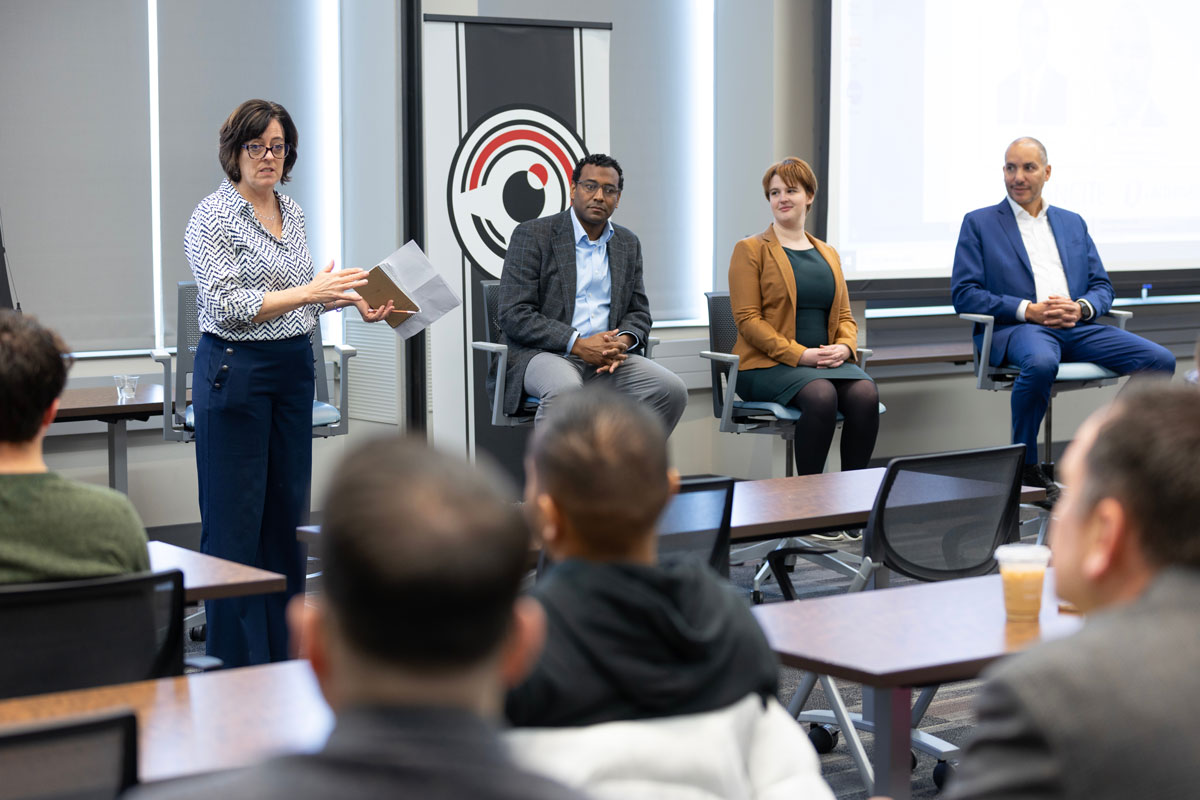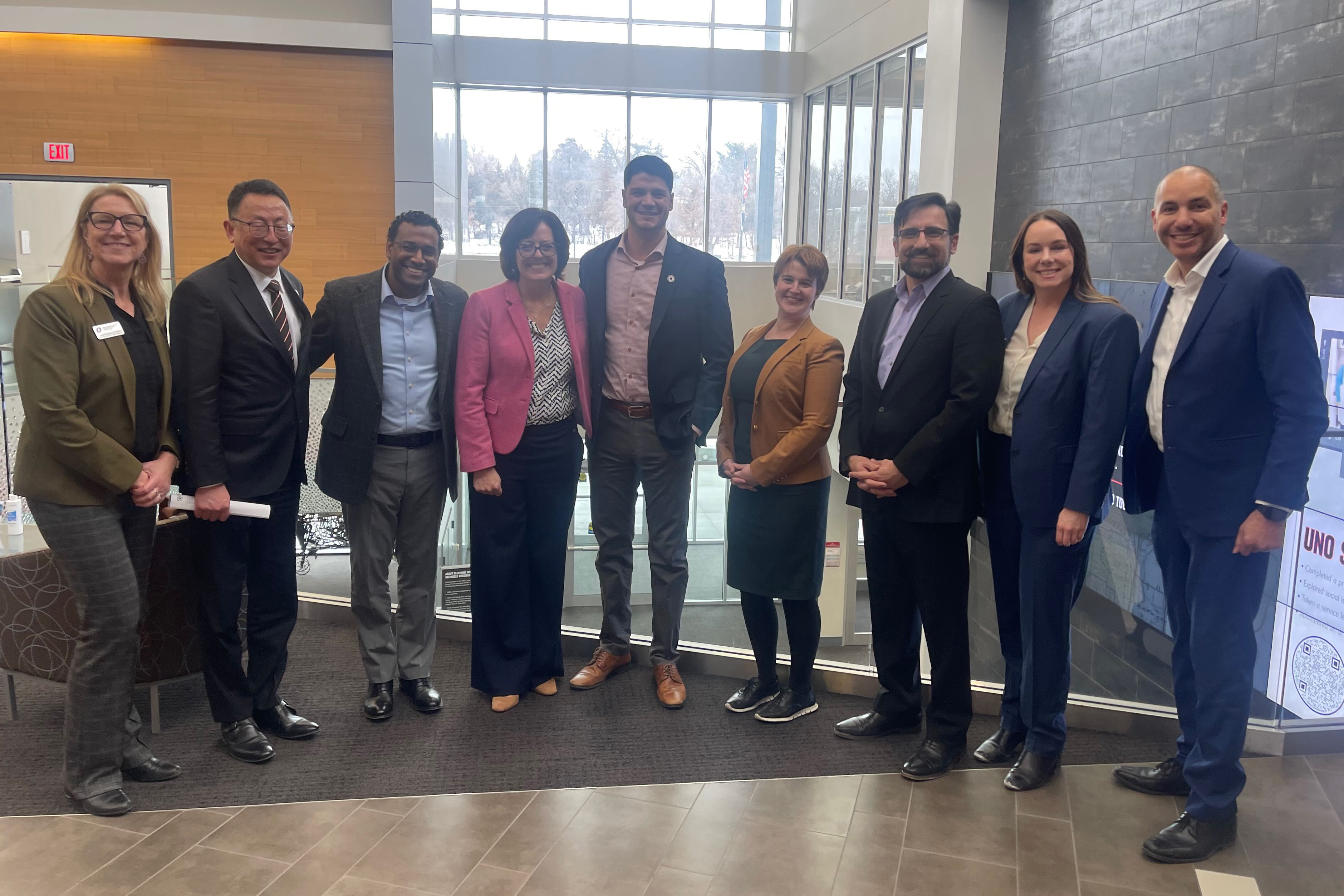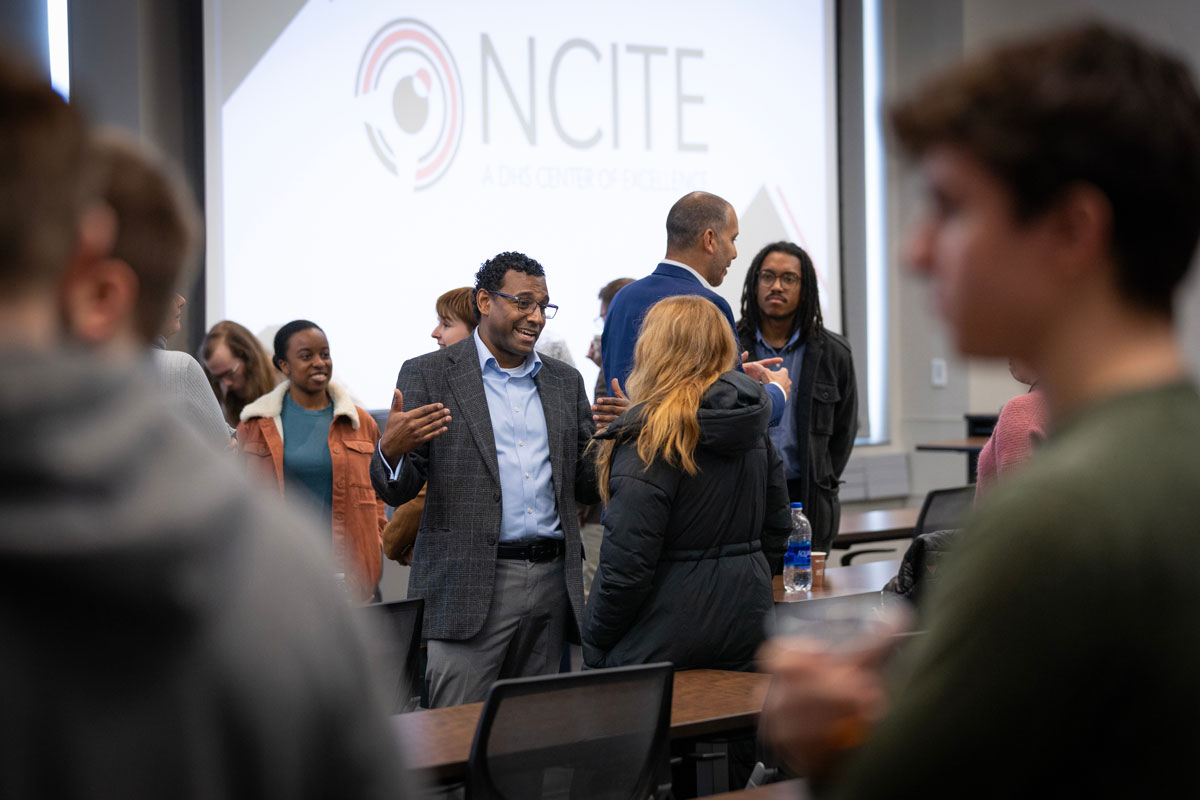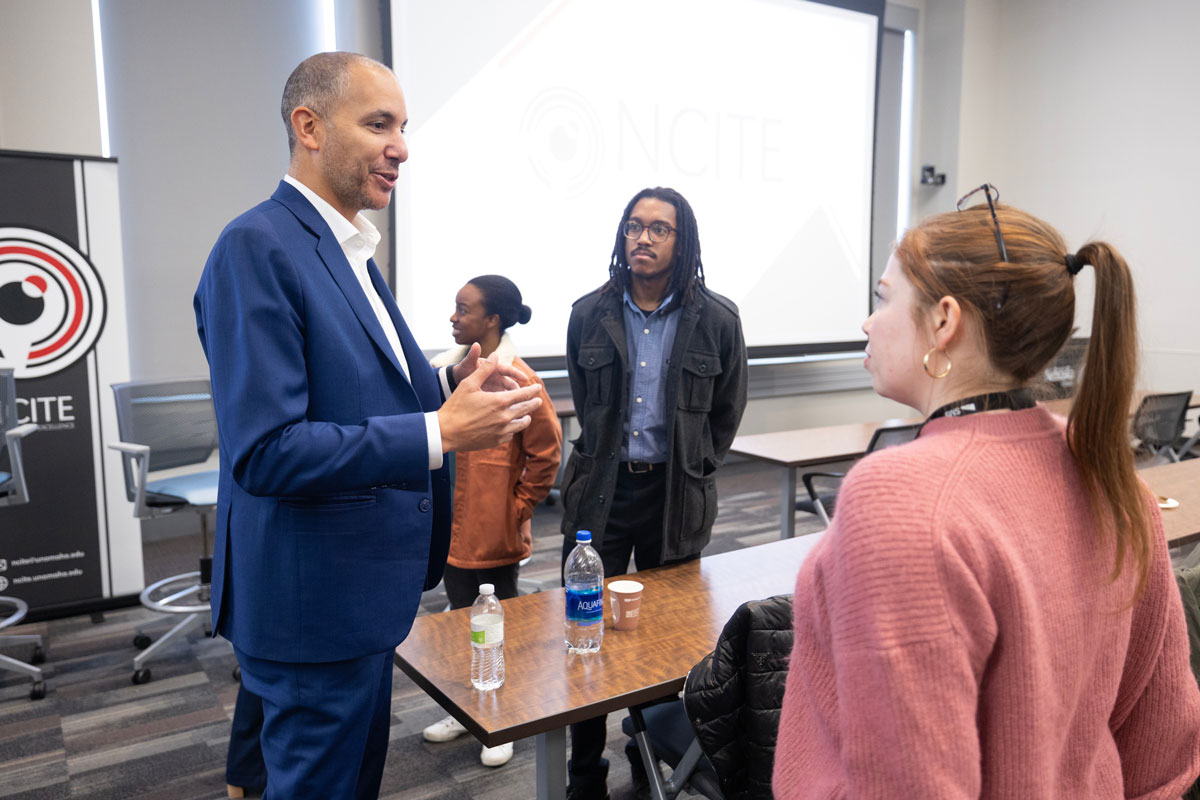Countering Terrorism, Countering Fear of the Other: State Department Visits NCITE
Three representatives from the U.S. State Department's Bureau of Counterterrorism visited NCITE in January where they learned about NCITE research and participated in a panel discussion about government careers and the current global threat landscape.
- published: 2024/01/29
- contact: Blake Ursch - NCITE Communications
- email: ncite@unomaha.edu
- search keywords:
- state
- counterterrorism
- careers
Three visitors from the U.S. State Department – each with a unique story of how they came to government service – shared a common message.
The business of state, they said, is built on relationships. Relationships between nations, yes. But, especially in their line of work, relationships between people.
“We want to share information – tell people what we know, what we don’t know, and what we think,” said Dexter Ingram, director of the Office of Countering Violent Extremism in the State Department’s Bureau of Counterterrorism. “We want to build things with our partners.”
Ingram was speaking at an NCITE panel, held Jan. 25 on the University of Nebraska at Omaha (UNO) campus, alongside two colleagues from the Bureau of Counterterrorism: Ian Moss, deputy coordinator for counterterrorism, and Chelsea Cohen, countering violent extremism policy advisor.
The panel capped a two-day visit to NCITE. Moss, Ingram, and Cohen toured the Center’s facilities on UNO’s Scott Campus and met with NCITE’s senior researchers, discussing current priorities for the State Department and how the Center’s counterterrorism work can help address them.
Protecting the Homeland – with an Eye to the World
“What happens here domestically, with each passing day, is more and more dependent upon what happens outside of our borders – and vice versa,” Moss said.
To that end, Moss and his colleagues met with:
- Director Gina Ligon, Ph.D., about a new NCITE project aimed at fostering stronger international partnerships among academic organizations that study counterterrorism and targeted violence.
- Sam Hunter, Ph.D., NCITE head of strategic initiatives, and Joel Elson, Ph.D., head of information science and technology research initiatives, about their research into malevolent uses of emerging technologies, such as AI and the metaverse.
- Seamus Hughes, senior research faculty and policy advisor, about a project he leads alongside Chapman University’s Pete Simi, Ph.D., on the rising trend of threats to public officials and what it says about Americans’ tolerance for political violence.
- Austin Doctor, Ph.D., head of counterterrorism research initiatives, about his research into best practices for reintegrating the families of foreign terrorist fighters who left the U.S. to fight for the Islamic State.
- Hunter and Ligon on a project that examines how organizational psychology can help government practitioners better understand the current terrorist landscape.
On the second day of their visit, Moss, Ingram, and Cohen met with UNO leadership, including Senior Vice Chancellor for Academic Affairs Phil He, Ph.D; Jody Neathery-Castro, Ph.D., interim associate vice chancellor for global engagement; Sher Jan Ahmadzai, director of the Center for Afghanistan Studies; and Julie Jimenez, assistant director for global grants.
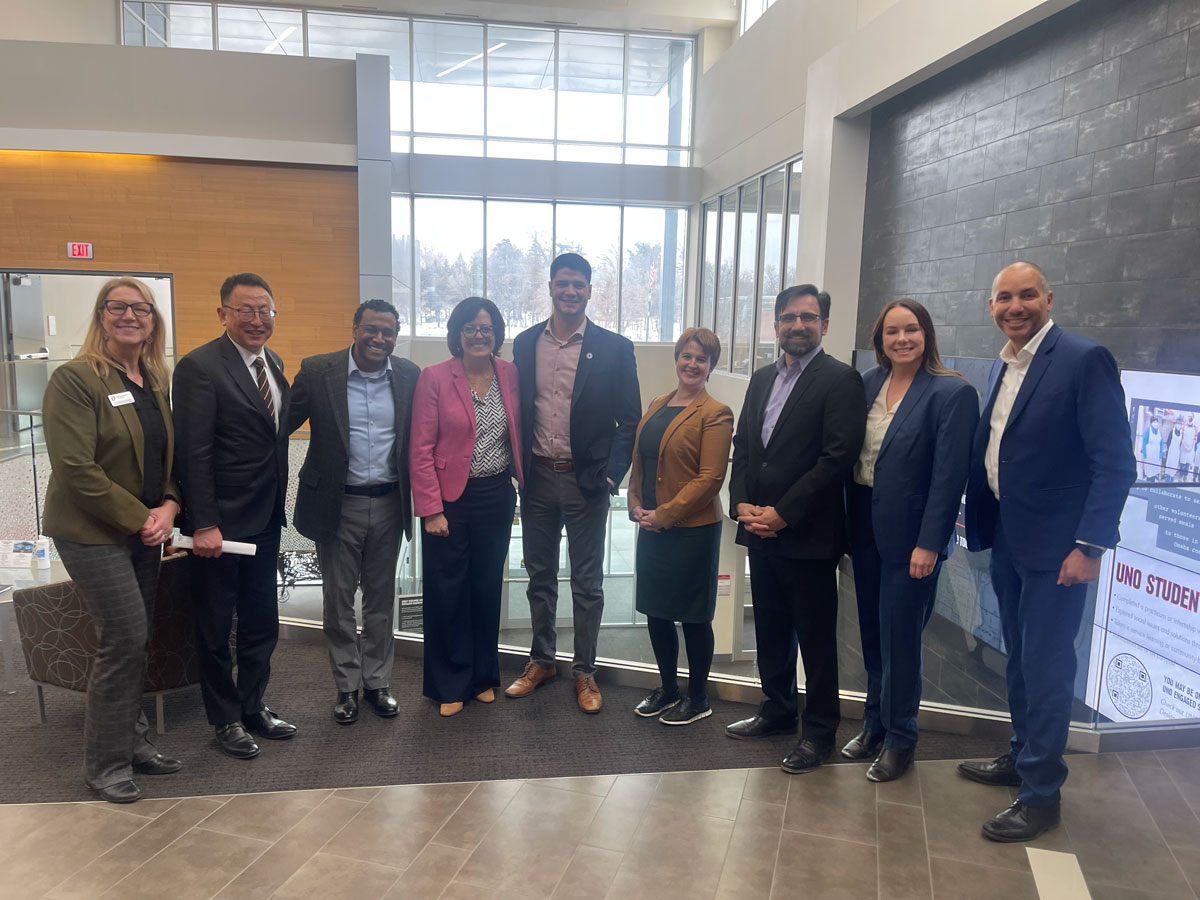
Countering Fear of the Other
The panel, jointly hosted with UNO International Programs, involved an audience of UNO students and NCITE faculty and staff. Neathery-Castro kicked off the event with welcome remarks.
“The work that NCITE does, and the work that the Department of State does, are really vital to promoting international peace and understanding,” she said. “I want the students in the room to understand … that countering (violent) extremism means countering the tendency to fear others – those who are different from yourself, those who come from a different cultural, linguistic, historic background.”
During the panel, Moss outlined current counterterrorism areas of focus for the State Department: massive ungoverned spaces in the Sahel region of west Africa and terrorist organizations affiliated with Iran, such as Hamas and Hezbollah.
Moss also mentioned the threat of racially and ethnically motivated violent extremism (RMVE), specifically from terrorists who embrace white supremacy.
It’s an ideology, Cohen said, that’s unfortunately spreading beyond U.S. borders.
Part of her job, she said, is “presenting sort of the human side, some of the vulnerability and the humility that comes with recognizing that this is a deeply rooted problem that we’re dealing with domestically,” to U.S. partners abroad.
“We’re turning to our (international) partners to get their perspective on it,” she said. “Building those partnerships and those relationships is a major part of what I do.”
Her office, she said, is largely focused on preventing violence before it happens. To do that, she said, the office partners with other organizations on efforts to promote social cohesion and create space for productive dialogue.
‘I’ve never seen anything like it’
All three panelists shared their personal and professional backgrounds for the students in the audience:
- Moss, a Marine Corps veteran from North Carolina who spent time as the director for human rights and national security issues for the National Security Council.
- Ingram, who was inspired to join the Navy after watching the 1986 movie Top Gun, attended Hampton University, and later served as deputy director of the State Department's Office of Preventing WMD (Weapons of Mass Destruction) Terrorism.
- And Cohen, a native of the San Francisco Bay Area, who “discovered I could take Japanese instead of calculus,” and wound up in Kosovo, working with the government there on countering violent extremism strategies.
The three also offered career advice that included saying “yes” to opportunities, not being afraid to fail, and not assuming that humble beginnings don’t put you at the table.
The panelists called for today’s young people to bring an array of backgrounds to the State Department.
"We all have unique perspectives,” Moss said. “It matters that folks from Montana, Omaha, New Mexico, North Carolina, are part of this process in Washington, D.C. What we do at the State Department is on behalf of the American people.”
NCITE graduate student Madison Scott, who is currently searching for a job, said the panel broadened her perspective on possible careers in government service. Scott joined dozens of other students in speaking with Moss, Ingram, and Cohen after the event.
All three panelists praised NCITE’s efforts to align with their ultimate goal – to make the world a safer place. Ingram, a member of NCITE’s Board of Directors, said he was excited to be a part of the Center’s work.
“I’ve never seen an organization like it,” he said. “The way NCITE can respond to world events and adapt and research – and really project that research internationally – is huge. It makes a difference. It saves lives. It saves money. I can’t tell you enough that the work that you do is important, and it’s valued, and it’s needed. So, thank you.”
